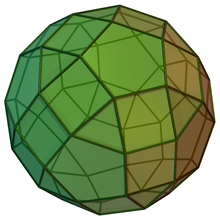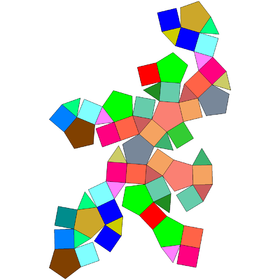Loading AI tools
74th Johnson solid From Wikipedia, the free encyclopedia
In geometry, the metabigyrate rhombicosidodecahedron is one of the Johnson solids (J74). It can be constructed as a rhombicosidodecahedron with two non-opposing pentagonal cupolae rotated through 36 degrees. It is also a canonical polyhedron.
| Metabigyrate rhombicosidodecahedron | |
|---|---|
 | |
| Type | Johnson J73 – J74 – J75 |
| Faces | 4x2+3x4 triangles 2+2x2+6x4 squares 4x2+4 pentagons |
| Edges | 120 |
| Vertices | 60 |
| Vertex configuration | 5.4(3.42.5) 4x2+8x4(3.4.5.4) |
| Symmetry group | C2v |
| Dual polyhedron | - |
| Properties | convex, canonical |
| Net | |
 | |
A Johnson solid is one of 92 strictly convex polyhedra that is composed of regular polygon faces but are not uniform polyhedra (that is, they are not Platonic solids, Archimedean solids, prisms, or antiprisms). They were named by Norman Johnson, who first listed these polyhedra in 1966.[1]
Alternative Johnson solids, constructed by rotating different cupolae of a rhombicosidodecahedron, are:
Seamless Wikipedia browsing. On steroids.
Every time you click a link to Wikipedia, Wiktionary or Wikiquote in your browser's search results, it will show the modern Wikiwand interface.
Wikiwand extension is a five stars, simple, with minimum permission required to keep your browsing private, safe and transparent.